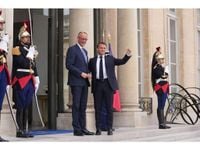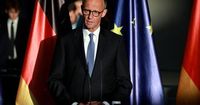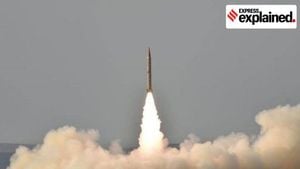On Wednesday, May 7, 2025, German Chancellor Friedrich Merz made his first foreign trip to Paris, meeting with French President Emmanuel Macron to discuss a revitalization of Franco-German relations. The two leaders pledged to reset ties between their nations and work collaboratively to enhance the European Union’s defensive capabilities and overall competitiveness.
In a joint article published in the French newspaper Le Figaro, Merz and Macron outlined a comprehensive agenda focused on security, competitiveness, and convergence. “As we face war on our continent, fierce global competition, accelerating climate and technological change, and threats of a global trade war, we have agreed on a comprehensive agenda to relaunch our relationship,” they stated. This commitment comes at a time when the EU is grappling with significant geopolitical challenges.
Merz’s choice of France for his inaugural international visit underscores his intention to prioritize the Franco-German partnership, which he views as essential for strengthening the EU's position on global trade and defense matters. His predecessor, Olaf Scholz, had struggled to find common ground with Macron, resulting in a period marked by misunderstandings and a lack of dynamic leadership within the EU.
On May 6, 2025, Merz secured his position as chancellor after an unprecedented second vote, a development that raised questions about the stability of his coalition government. Despite this setback, he expressed determination to focus on European policy as a central aspect of his administration. “The world is in such disarray that a German chancellor must look after foreign policy and European policy much more than in the past,” Merz remarked during a series of interviews following his parliamentary confirmation.
Merz is keen on enhancing Germany’s military capabilities within NATO, emphasizing the need for joint procurement projects and increased production of military equipment. “I know that many of you expect more German leadership than we have seen in the past, both on the EU and international level,” he told fellow conservatives at a European People’s Party congress in Valencia last month. “We will and we have to invest a lot more energy into moving Europe forward.”
Following his discussions with Macron, Merz is set to travel to Warsaw for talks with Polish Prime Minister Donald Tusk. The agenda for these talks will include pressing issues such as irregular migration, the ongoing conflict in Ukraine, and defense strategies. The topic of migration has become increasingly contentious in Germany, especially in the wake of the February 2025 national elections, where the anti-immigrant party secured second place, posing a significant challenge to Merz’s coalition.
Germany’s new interior minister, Alexander Dobrindt, is expected to announce stricter border controls, a move that some EU officials, particularly in Poland, worry may hinder freight traffic and compromise the freedom of movement across the 27-nation bloc. The previous government had already intensified policing and conducted spot checks along Germany’s borders, a trend that has raised concerns about the implications for intra-EU relations.
In a separate but related diplomatic effort, Syrian interim leader Ahmed al-Sharaa is also visiting France on the same day, marking his first European visit. This meeting with Macron aims to strengthen ties between Syria and France, despite the ongoing sectarian violence and instability in Syria. Al-Sharaa, who spoke in Damascus on March 9, 2025, is seeking to enhance relations with European nations as part of his leadership strategy.
The simultaneous meetings highlight a significant moment in European politics, where both Merz and al-Sharaa are navigating complex geopolitical landscapes. For Merz, the focus remains firmly on strengthening European unity and security, while al-Sharaa aims to garner support for his government amidst ongoing challenges in Syria.
The Franco-German partnership, long seen as the backbone of European integration, is poised for a new chapter under Merz’s leadership. His proactive approach to foreign policy and commitment to addressing pressing issues such as migration, security, and defense could redefine Germany’s role within the EU and its relationships with neighboring countries. As these discussions unfold, the outcomes will likely have lasting implications for the future of Europe.





